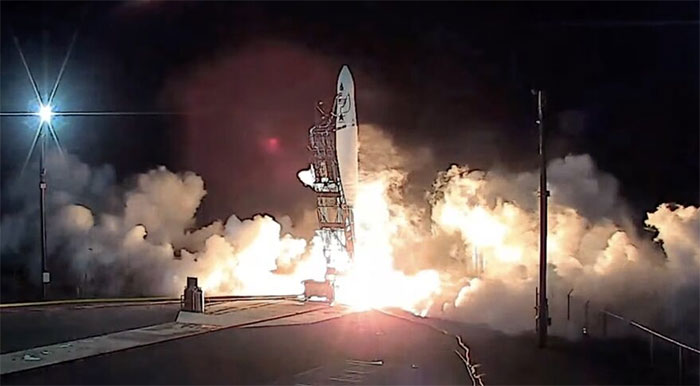The 13-meter tall Launch Vehicle 0007 successfully carried experimental equipment to an altitude of approximately 500 km, marking a significant milestone for Astra.
The Launch Vehicle 0007 (LV0007) launched from the Pacific Spaceport Complex on Kodiak Island, Alaska, at 1:16 PM on November 20 (Hanoi time), carrying experimental equipment for the United States Space Force. Approximately 9 minutes after launch, the rocket’s upper stage entered orbit at an altitude of around 500 km. This marks Astra’s first successful launch of a payload into orbit, a startup based in California.
“This mission was extremely challenging. The team has worked diligently for many years, going through failure after failure to achieve success. Everyone is incredibly passionate,” shared Chris Kemp, CEO of Astra.

LV0007 is 13 meters tall, suitable for the small rocket segment in the space launch market.
Astra achieved its first successful rocket launch in December 2020, but it did not carry any payload and did not reach the 500 km orbit. In a test in August this year, the Launch Vehicle 0006 veered off course during takeoff. It ascended to an altitude of several tens of kilometers before the engine shut down.
Alongside SpaceX, Rocket Lab, and Virgin Orbit, Astra has become one of the American companies reaching orbit with a private rocket. The 13-meter tall LV0007 is tailored for the small rocket segment in the space launch market. In the future, Astra aims to launch as many small rockets as possible, with a goal of launching one each day by 2025 and reducing costs further.
“We have rockets number 8, 9, and 10 in production. We are just getting started,” Kemp noted.
Astra’s ambitions extend beyond just manufacturing and launching rockets. For instance, the company is developing a “satellite bus” that allows multiple customers to place their equipment on a spacecraft without having to build it themselves. Astra has also filed with the U.S. Federal Communications Commission to establish a system of 13,600 Internet satellites.


















































